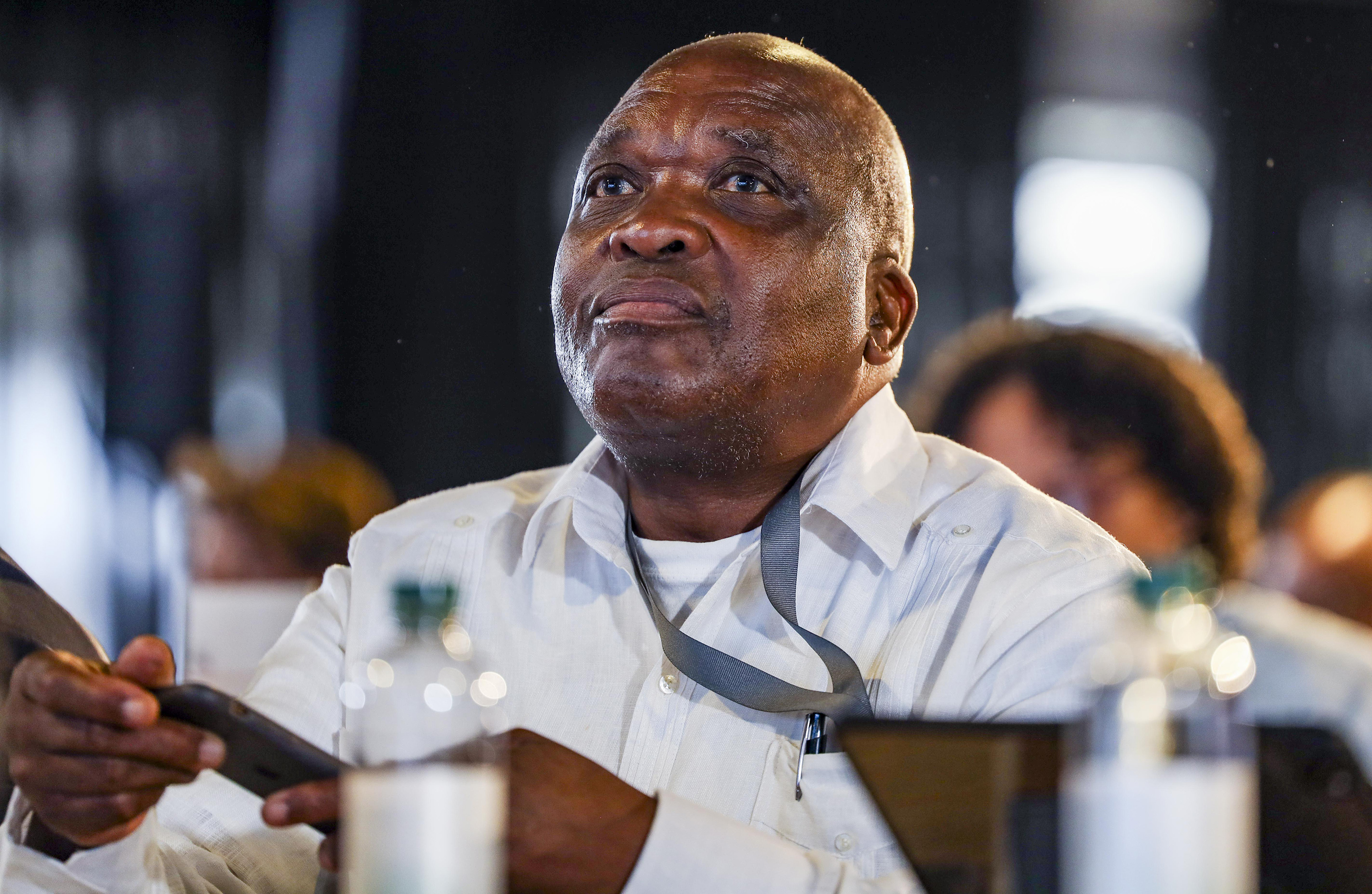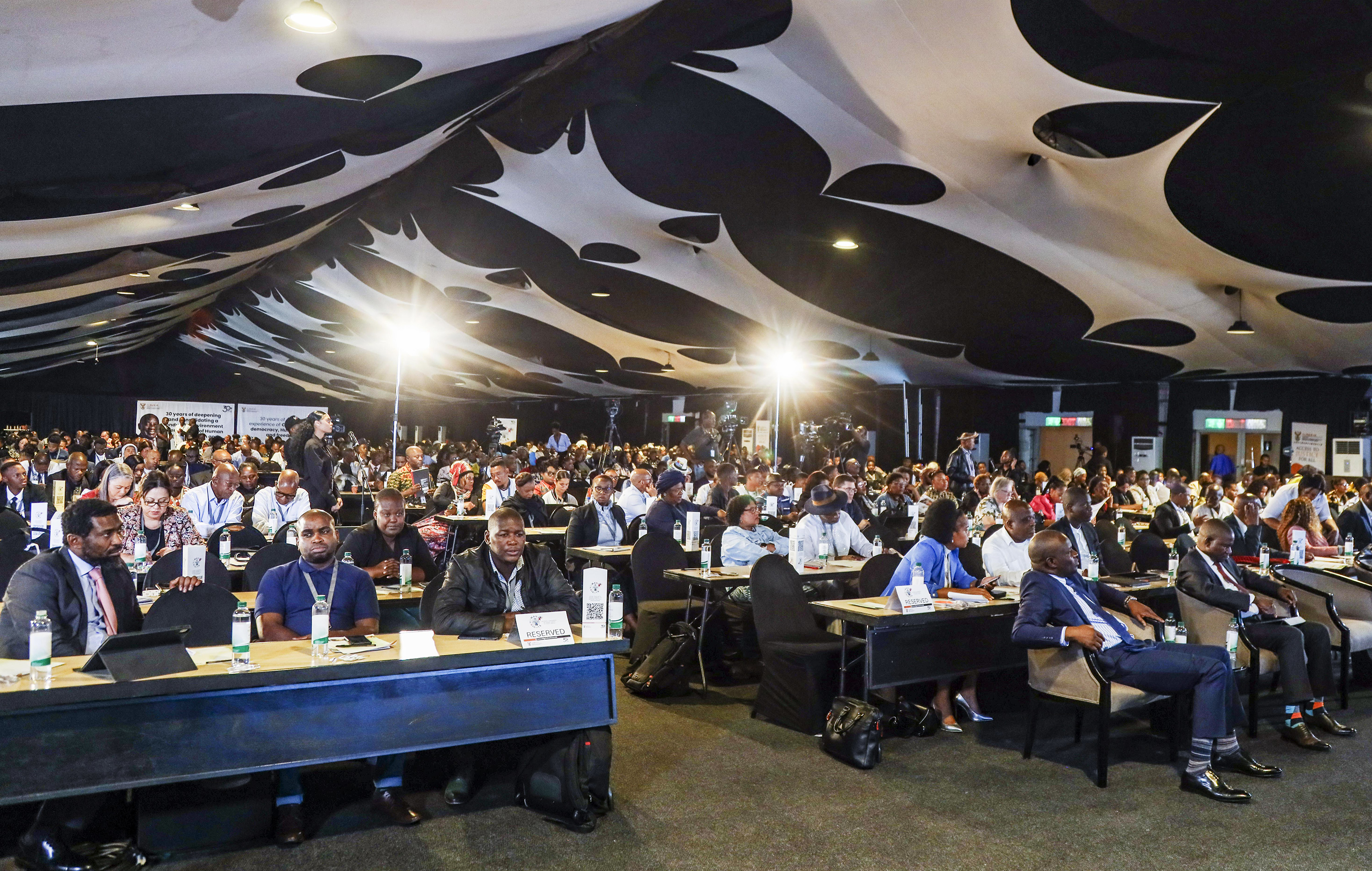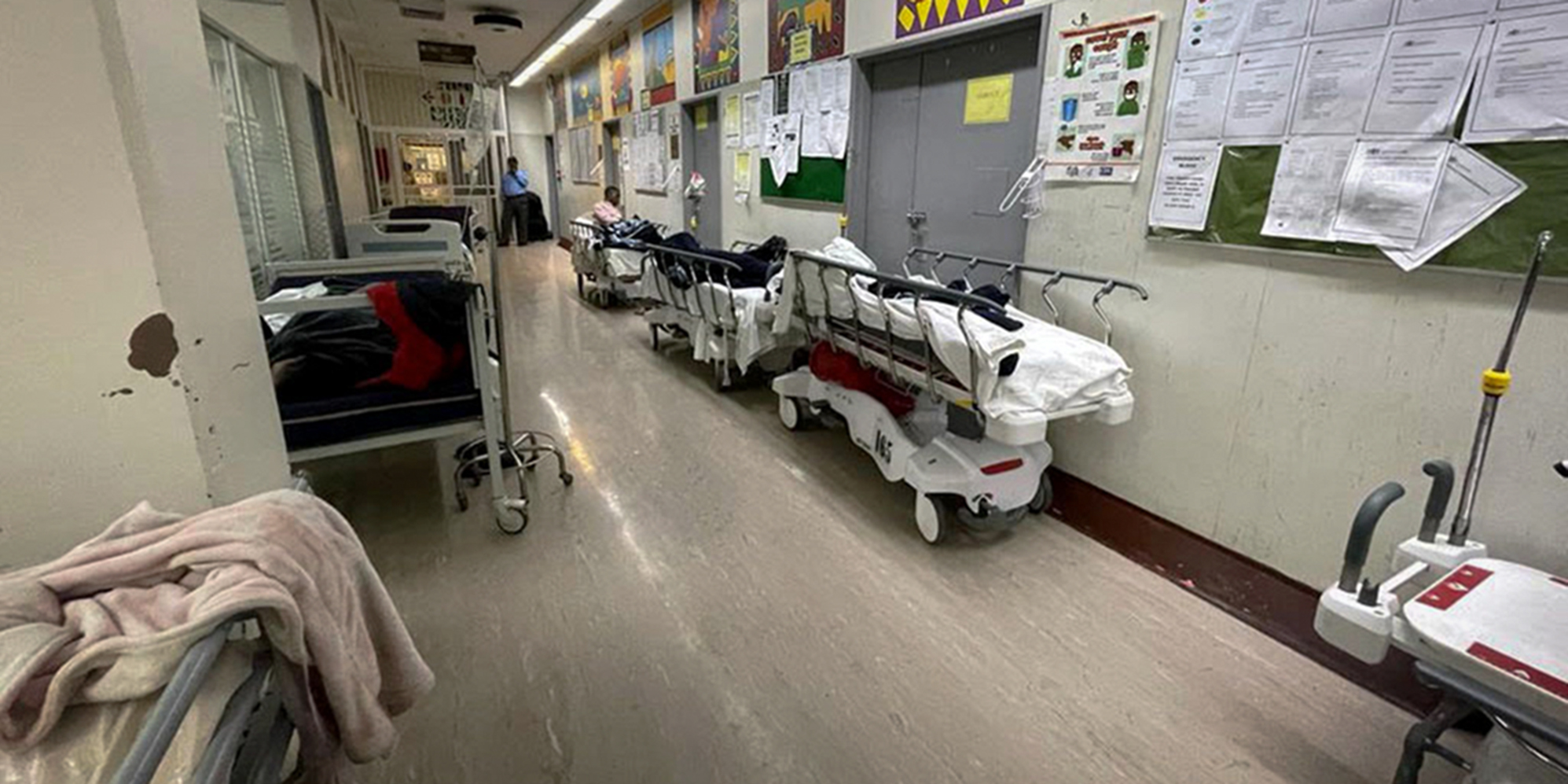‘If we want to realise rights, if we want to use health as an intervention tool to fight poverty, fight inequality and improve people’s quality of life, we need to stop disinvesting in health. We need to invest in health. We need to allocate sufficient funds. We need to spend those funds properly and stop the theft,” SECTION27 executive director Sasha Stevenson said on day two of the Department of Justice and Constitutional Development’s National Human Rights Conference on Tuesday.
Stevenson was giving input during a roundtable discussion about how access to healthcare and social security can be a critical tool for fighting poverty and improving living conditions.
While South Africa’s healthcare system has transformed since 1994, the reality is that health facilities are crumbling because they are underfunded and crippled by corruption and maladministration.
This is why government officials, dignitaries and civil society are gathered at the Birchwood Hotel and OR Tambo Conference Centre in Boksburg for the three-day conference. It aims to take stock of the strides made in the fight for human rights and critically evaluate what more needs to be done to ensure all people in South Africa live in dignity as the nation celebrates 30 years of democracy.
 Health Minister Dr Joe Phaahla at the Human Rights Conference held at the Birchwood Hotel and Conference Centre in Boksburg on 19 March 2024. (Photo by Gallo Images / OJ Koloti)
Health Minister Dr Joe Phaahla at the Human Rights Conference held at the Birchwood Hotel and Conference Centre in Boksburg on 19 March 2024. (Photo by Gallo Images / OJ Koloti)
‘What then went wrong?’
Opening the discussion on access to healthcare and social security, panel facilitator Dr Phophi Ramathuba said democracy brought a breakthrough for the healthcare industry.
She recounted how the homeland system before 1994 fragmented healthcare, resulting in unequal quality of care and discrimination based on race, geography and even tribe.
“But Mandela’s administration was able to amalgamate the different departments of health into one national Department of Health in a short space of time, and that was a breakthrough that needs to be celebrated. What, then, went wrong?” Ramathuba asked.
Read more in Daily Maverick: ‘Much to be done’ – Ramaphosa acknowledges challenges to human rights in SA
Health Minister Dr Joe Phaahla detailed the government’s efforts to transform healthcare since 1994, adding that the attainment of good health services was part and parcel of the liberation struggle.
Reading from the Africans’ Claims document drafted by the ANC in 1943, Phaahla said: “We regard it as a duty of the state to provide adequate medical health facilities for the entire population of the country. We deplore and deprecate the fact that the state has not carried out its duty to the Africans in this regard and has left this important duty to philanthropic and voluntary agencies.”
The document called for a drastic overhaul and reorganisation of the healthcare system, an aspiration the democratic government has taken on and spearheaded, the minister claimed.
Some monumental successes of the democratic dispensation included then president Nelson Mandela’s proclamation that pregnant women and children under the age of six would receive free medical care at all public health facilities.
Phaahla said the proclamation was implemented immediately, and a few years later the government decided that all services at all public primary healthcare facilities would be provided free of charge.
Since 1994, the government had also put policy in place ensuring no one seeking care was turned away from a public healthcare facility, and no one could be denied emergency care from any healthcare facility in the country, public or private.
 Justice Minister Ronald Lamola at the conference in Boksburg on 19 March 2024. (Photo: Gallo Images / OJ Koloti)
Justice Minister Ronald Lamola at the conference in Boksburg on 19 March 2024. (Photo: Gallo Images / OJ Koloti)
The government had also ensured that as many people as possible had access to healthcare facilities by implementing a massive infrastructure programme in which district and regional hospitals, teaching hospitals and clinics had been built across the country.
“Major steps were taken to increase access to public health services to improve their quality and health outcomes. But you also have to acknowledge that over the same period of three decades there’s also been increased inequality,” Phaahla added. We have created opportunities for a two-tier health system: One for those who have sufficient income, and public health, which looks after those with low income or who are unemployed.”
The health sector was also facing a number of challenges which were slowing progress in making equitable and quality healthcare for all a reality.
These included chronic underfunding of the healthcare system, and unstable and inappropriate management at various levels of the system.
“But I think the biggest challenge to our system today, 30 years down the line, is the fact that we have not been able to close the gap, which our forebears in 1943 and also in 1952 had already identified in terms of making sure that we close the gap between access and quality of access to health services by those who have income and those… who have low income and [are] unemployed.”
 Human Rights Conference attendees at the Birchwood Hotel and Conference Centre in Boksburg on 19 March 2024. (Photo: Gallo Images / OJ Koloti)
Human Rights Conference attendees at the Birchwood Hotel and Conference Centre in Boksburg on 19 March 2024. (Photo: Gallo Images / OJ Koloti)
‘Huge asset’
Taking stock of the past 30 years, Stevenson praised South Africa’s current healthcare system, which glows compared with the one under apartheid, which systematically underfunded large groups of the country and catered mainly to the white minority.
“I think we need to recognise straight up-front that we have a huge asset in our public health system. We have training infrastructure. We have health facilities at every level, from primary healthcare to specialist level. There are so many problems in the system, and there are so many inequities. But the system itself is an asset and actually puts us in quite a different position to many other countries, including countries on the continent that are trying to develop towards universal health coverage,” Stevenson said.
She said South Africa’s combination of a large public healthcare system, which can be harnessed to improve access for everyone, and a strong private sector that caters to a small portion of the population on medical aid, gives the country a key advantage.
Stevenson echoed Phaahla’s statements that while a lot has been achieved in the healthcare system, there is room for improvement.
“We need to stop defunding our health system. It’s not just that we’re underfunding our health system. What we are doing is actively defunding the system. We are actively instituting budget cuts. We are not spending the money that gets allocated. We are mismanaging some of the money that gets allocated. And rife corruption means a sizeable proportion of the health budget just gets stolen,” she said.
Stevenson added that the recent budget cuts mean the nation is spending less money per patient in the public healthcare system, which inhibits the quality of care.
Read more in Daily Maverick: Tertiary hospital professionals sound the public healthcare alarm after severe national budget cuts
The budget cuts affected more than just the health facility infrastructure grant, which meant provinces were limited in how they could improve health infrastructure as facilities crumbled.
South Africa had a healthcare workers crisis where not enough were employed at facilities, while medical graduates sat at home, unable to get jobs.
“This year’s Budget saw a real decrease of two-and-a-half percent in employee compensation. That means we can’t employ new healthcare workers, and the minister has to juggle overtime and new graduates to the market. It makes it impossible for us to staff our health system in the way we need it,” Stevenston said.
Real reform now
Echoing the authors of the Africans’ Claims document, and Phaahla, Stevenson called for systemic reform of the national health system.
“We have to stop the stalled health system reform efforts. Talk of NHI has taken up the last two decades. The bill has passed. It contains real drawbacks that have been ignored for political reasons. But they’re ignored at our peril because there are real problems in that bill,” Stevenson said.
Two decades of ruminating about the National Health Insurance Bill had stalled real health system reform. Policies could be implemented immediately that would improve the system and better prepare it for an NHI.
Read more in Daily Maverick: The NHI debate is throwing up misconceptions – here are the facts
“We need to push health reform that will actually show results that will show results now and into the future and that will build the trust that we’ve systematically broken down over the last decades. Doing so, I suggest, will enable us as a country to build on the past 30 years and to make the right to health real for everyone in South Africa,” Stevenson added. DM




 Three Decades of Respect for and Promotion of Human Rights media conference at Birchwood Hotel and Conference Centre on March 19, 2024 in Boksburg, South Africa. South Africa celebrates 30 years of Constitutional Democracy and Human Rights this year. As we reflect on this significant milestone, Minister Ronald Lamola and the Department of Justice and Constitutional Development are convening the National Conference to assess the progress and chart a way forward in advancing human rights since 1994. Held under the theme: ìThree Decades of Respect for and Promotion of Human Rightsî, the conference will gather key stakeholders and government Departments to: Reflect on 30 Years of South Africaís transformation agenda and efforts towards promoting democracy, development and human rights. Consider the extent to which progressive realisation of human rights has over the years been promoted through economic policies and budgeting priorities. Evaluate governance measures established to strengthen national structures, institutions and civil society which play a role in promoting and safeguarding human rights. Unpack our national, regional and international actions and policies in strengthening the promotion and the protection of human rights in accordance with international human rights standards. (Photo by Gallo Images/OJ Koloti)
Three Decades of Respect for and Promotion of Human Rights media conference at Birchwood Hotel and Conference Centre on March 19, 2024 in Boksburg, South Africa. South Africa celebrates 30 years of Constitutional Democracy and Human Rights this year. As we reflect on this significant milestone, Minister Ronald Lamola and the Department of Justice and Constitutional Development are convening the National Conference to assess the progress and chart a way forward in advancing human rights since 1994. Held under the theme: ìThree Decades of Respect for and Promotion of Human Rightsî, the conference will gather key stakeholders and government Departments to: Reflect on 30 Years of South Africaís transformation agenda and efforts towards promoting democracy, development and human rights. Consider the extent to which progressive realisation of human rights has over the years been promoted through economic policies and budgeting priorities. Evaluate governance measures established to strengthen national structures, institutions and civil society which play a role in promoting and safeguarding human rights. Unpack our national, regional and international actions and policies in strengthening the promotion and the protection of human rights in accordance with international human rights standards. (Photo by Gallo Images/OJ Koloti)